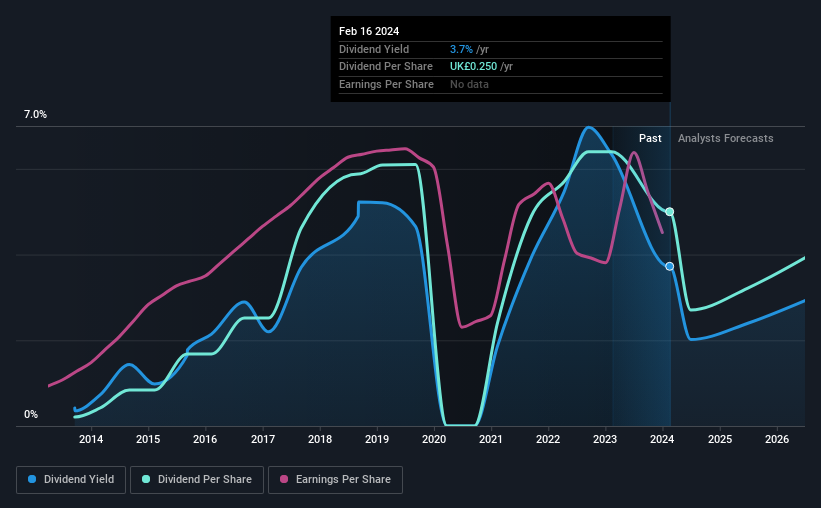Don't Race Out To Buy Redrow plc (LON:RDW) Just Because It's Going Ex-Dividend
Some investors rely on dividends for growing their wealth, and if you're one of those dividend sleuths, you might be intrigued to know that Redrow plc (LON:RDW) is about to go ex-dividend in just four days. The ex-dividend date occurs one day before the record date which is the day on which shareholders need to be on the company's books in order to receive a dividend. The ex-dividend date is of consequence because whenever a stock is bought or sold, the trade takes at least two business day to settle. Therefore, if you purchase Redrow's shares on or after the 22nd of February, you won't be eligible to receive the dividend, when it is paid on the 8th of April.
The company's next dividend payment will be UK£0.05 per share, on the back of last year when the company paid a total of UK£0.25 to shareholders. Based on the last year's worth of payments, Redrow stock has a trailing yield of around 3.7% on the current share price of UK£6.71. If you buy this business for its dividend, you should have an idea of whether Redrow's dividend is reliable and sustainable. As a result, readers should always check whether Redrow has been able to grow its dividends, or if the dividend might be cut.
View our latest analysis for Redrow
If a company pays out more in dividends than it earned, then the dividend might become unsustainable - hardly an ideal situation. That's why it's good to see Redrow paying out a modest 39% of its earnings. That said, even highly profitable companies sometimes might not generate enough cash to pay the dividend, which is why we should always check if the dividend is covered by cash flow. Over the last year, it paid out more than three-quarters (87%) of its free cash flow generated, which is fairly high and may be starting to limit reinvestment in the business.
It's positive to see that Redrow's dividend is covered by both profits and cash flow, since this is generally a sign that the dividend is sustainable, and a lower payout ratio usually suggests a greater margin of safety before the dividend gets cut.
Click here to see the company's payout ratio, plus analyst estimates of its future dividends.
Have Earnings And Dividends Been Growing?
Businesses with shrinking earnings are tricky from a dividend perspective. If business enters a downturn and the dividend is cut, the company could see its value fall precipitously. Redrow's earnings per share have fallen at approximately 6.3% a year over the previous five years. Ultimately, when earnings per share decline, the size of the pie from which dividends can be paid, shrinks.
Another key way to measure a company's dividend prospects is by measuring its historical rate of dividend growth. In the last 10 years, Redrow has lifted its dividend by approximately 37% a year on average.
To Sum It Up
Is Redrow worth buying for its dividend? Earnings per share have fallen significantly, although at least Redrow paid out less than half of its profits and free cash flow over the last year, leaving some margin of safety. Overall, it's hard to get excited about Redrow from a dividend perspective.
So if you want to do more digging on Redrow, you'll find it worthwhile knowing the risks that this stock faces. Every company has risks, and we've spotted 1 warning sign for Redrow you should know about.
A common investing mistake is buying the first interesting stock you see. Here you can find a full list of high-yield dividend stocks.
Have feedback on this article? Concerned about the content? Get in touch with us directly. Alternatively, email editorial-team (at) simplywallst.com.
This article by Simply Wall St is general in nature. We provide commentary based on historical data and analyst forecasts only using an unbiased methodology and our articles are not intended to be financial advice. It does not constitute a recommendation to buy or sell any stock, and does not take account of your objectives, or your financial situation. We aim to bring you long-term focused analysis driven by fundamental data. Note that our analysis may not factor in the latest price-sensitive company announcements or qualitative material. Simply Wall St has no position in any stocks mentioned.

